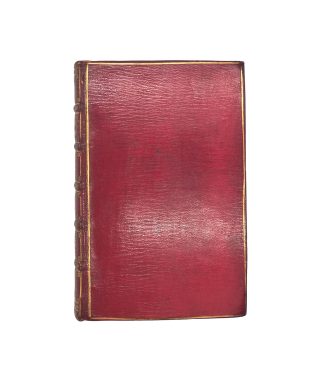ARISTOPHANES.
FINE BINDING AND PROVENANCE
Les comedie del facetis, translated by Bartolommeo Rosettini & Pietro Rositini.
Venice, Vincenzo Vaugris, 1545£3,500.00
FIRST EDITION THUS. 8vo. Ff. (i) 305. Mainly italic letter. Woodcut printer’s device to tp, floriated initial, woodcut printer’s device to last leaf. Bookplates of Charles Williams-Wynn (1775-1850) and Charles Meek (1885-1965) to pastedowns, bookplate of Robert J. Hayhurst (mid 20th c.) to ffep. Ms to fly ‘Bought at Daly’s sale for 1 Guinea’, overleaf ‘This Edition sold at Askew’s Sale for 3 Guineas’. A few small wormholes affecting four letters of text on verso of tp. A very good, clean copy in handsome C18 straight grained red morocco, ruled in gilt, spine gilt with striped and floral tools.
First edition in Italian of this important collection of eleven of Aristophanes’ comedic plays by Italian translators Pietro Rosettini and Bartolomeo Rositini (both C16th c.). Andreas Divus was the first to circulate Latin translations of Aristophanes’ plays in 1528, and their success lead to several translations and adaptations into modern languages. These influenced Renaissance and post-Renaissance literature, inspiring figures like Racine and Goethe to compose based on popular texts like The Wasps and The Birds.
Aristophanes was the greatest of the Athenian comic dramatists. For richness and fertility of imagination probably only Shakespeare is comparable and Aristophanes’ direct influence on English literature was considerable; the comedies of Jonson, Middleton and Fielding derive from him. Apart from constituting one of the surviving glories of Hellenic culture, Aristophanes’ comedies are an invaluable source for its social history. His surviving plays – out of a probable forty or fifty – provide us with an accurate if satirical commentary on the political, religious, sexual, economical and domestic life of Athens over a period of thirty six years. His changes in style and content match the concurrent constitutional and social changes in the State itself. The plays’ themes are invariably contemporary; a mocking mirror to the condition of the city.
This copy was in the 1775 sale of the collection of Dr Anthony Askew (1722-1772), who had attempted “to secure a complete series of all the Greek classics ever published” (De Ricci p. 52), and in 1792 in the sale of the collection of Denis Daly (1748-1791), Irish landowner and politician.
Charles Williams-Wynn (1775-1850), was a British Tory politician from an illustrious Welsh family who was a Member of Parliament for Old Sarum and Montgomeryshire. Charles Meek (1885-1965) was a well-known anthropologist and colonial administrator. Robert J. Hayhurst (mid 20th c.) was the head of a successful group of pharmacies and a prolific book collector.
Adams A1721; BMSTC It. 42; Not in Gamba or Brunet.In stock








